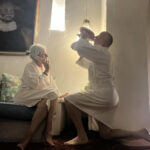Survival instinct kicks in for veteran musos
An article about surviving in the music industry, including comments from Mark Seymour.
Author: Max Shand, Sydney Morning Herald.
Date: 30 April 2020.
Original URL: https://www.smh.com.au/culture/music/survival-instinct-kicks-in-for-veteran-musos-20200417-p54kwa.html
Article Text
Steve Kilbey says heroin addiction was by far the biggest hurdle he has overcome.
“Everything I had, I lost – my money, my friends, my family, my self-respect,” says the veteran frontman of alternative rock band The Church.
One night in 1990, when Kilbey was in a Sydney pub with Grant McLennan of The Go-Betweens, “we both had the blues and said ‘let’s get some heroin'”.
The Church frontman Steve Kilbey has overcome hard times before.
The Church frontman Steve Kilbey has overcome hard times before.CREDIT:JAMES BRICKWOOD
Like so many before him, Kilbey thought he was immune to the consequences but within two or three months the drug had taken hold.
“I was a proper shooting-up idiot junkie, wasting all the money I had amassed,” he says.
It took a voice from heaven, several children spread between America and Sweden and a decade touring as a less-than-inspiring frontman for Kilbey to get clean. After spending 20 years regaining their audience, The Church toured Australia in 2018, selling-out Sydney’s State Theatre.
But having finally returned to a position of strength, COVID-19 has forced Kilbey to cancel all his upcoming gigs.
“I had shows coming out my ears this year; I had solo shows, band shows, private shows, garden shows, birthday and wedding shows and it’s all over. They’re all gone.”
Rather than calling it a day, Kilbey has begun exploring alternative revenue generators.
“I was sitting at home and thinking, I’m just going to do a show on Instagram.” Soon afterwards, Kilbey was playing his first virtual show and earning money through an attached Paypal account.
With close to 1000 songs in his arsenal and no intention to repeat a track, Kilbey says he has “about a hundred weeks in me.”
Sarah McLeod from The Superjesus spent years playing small venues.
Like Kilbey, Sarah McLeod of grunge act The Superjesus “came out of the gates really strong in 1994 and then had a massive down period 10 years after that”.
Following unsatisfactory sales of their third album, Rock Music, the band became disillusioned, took to drinking and, without even saying goodbye, “everybody just went home and didn’t speak to each other for 10 years”.
Shifting towards solo work, McLeod and her team began to accrue significant debts commissioning photo shoots, touring and recording.
“I didn’t know what was going on until it was too late,” she says.
After a decade selling out shows, McLeod was forced to park her ego and start again. For two years she travelled regional Australia, playing anywhere, to anyone. Irrespective of the venue, McLeod would perform like she was centre-stage at Madison Square Garden.
“I got the list of people I owed money to and paid them back one at a time, inch by inch,” she says.
When COVID-19 struck, McLeod was about to start touring again and, to avoid falling back into debt, had to think quickly how to survive.
She started a Patreon account, McLeod’s Wolfpack, that offers new music in exchange for a subscription fee.
“I figure that instead of sitting around mourning I need to make lemonade from my lemons,” she says.
For the first time in her career she’s making a regular income. There are other bonuses, too.
“You get people to your show who normally wouldn’t, like my dad who hasn’t seen me play since I was in my cover band in the ’90s. He’s been watching all my shows online and he’s like, ‘wow, you’re so much better than I thought’.”
In contrast to the immediate success of The Superjesus, Mark Seymour of The Hunters & Collectors regards “going to England for the first time and tanking” as his greatest challenge. Arriving during a recession, the band found that “there was no demand for live music”.
The only way to make money was to produce commercial records, something Seymour refused to do. “We’d signed to A&M, Virgin, and then later Atlantic, and all these international deals vanished,” he says. “We ran out of money and had to come home.”
“It wasn’t until we came back to Australia that I started connecting with the place I was in and writing songs about the landscape.”
Mark Seymour is confident the appetite for live shows will return.
Dropping the pretentiousness of their second album and “getting honest with what I was writing songs about” saw the band begin to fill rooms, then larger venues, and finally headline national tours. The band occupied the frontline of the Australian festival circuit until just recently, where a year of shows was quite literally washed away by floods and then COVID-19.
“Instead of looking at this catastrophe as though it’s an endgame, read between the lines and think about the long term.”
Seymour is convinced the appetite for live music will return after the lockdown.
Recognising that there may be some “residual anxiety amongst punters about going out”, Seymour spins an alternate story, one where “the whole live scene, even on the most basic pub corner level, will be crawling with people just gasping to go out.”
If you back yourself as an artist, Seymour calls for you to “plan as though things are going to improve”.
Comments
N/A.





